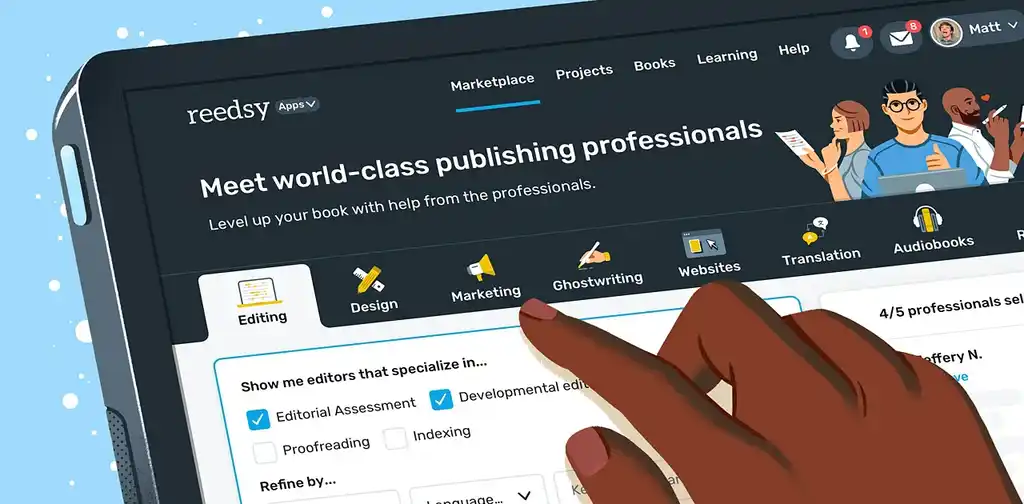Blog •
Last updated on May 07, 2024
Is IAPWE Legit? Weighing Up the Evidence
Linnea Gradin
The editor-in-chief of the Reedsy Freelancer blog, Linnea is a writer and marketer with a degree from the University of Cambridge. Her focus is to provide aspiring editors and book designers with the resources to further their careers.
View profile →Savannah Cordova
Savannah is a senior editor with Reedsy and a published writer whose work has appeared on Slate, Kirkus, and BookTrib. Her short fiction has appeared in the Owl Canyon Press anthology, "No Bars and a Dead Battery".
View profile →The International Association of Professional Writers and Editors, or IAPWE, is an organization which has been around since 2015. Since then, it’s offered up a variety of services for writers — some more tangible than others — and become fairly well-known in certain freelancing circles.
So is IAPWE a legitimate, helpful organization to join in 2024, or not really worth the effort? Might it even be (dare we say it) a scam to take freelancers’ money in membership fees, or just something to be watchful of? In this post, we’ll review the most recent evidence available to get to the bottom of things.
What is IAPWE meant to offer?
Since it arrived on the scene, IAPWE has promised two key things for freelancers: a) an up-to-date job board with well-paying assignments, and b) resources such as blog posts, templates for various pieces, an in-house plagiarism checker, and educational courses you can take on their site.
You can access all this through an IAPWE membership, which has multiple pricing tiers — one of which is supposedly free (more on that later). For now, let’s take a deeper dive into IAPWE’s offerings, where they’re sourced, and how helpful they are for freelancers.

JOIN REEDSY
Find exciting new projects
We connect publishing professionals with our community of 1,500,000 authors.
Job opportunities: where do they come from?
According to their website, IAPWE’s job board consists of “the most updated, legitimate and vetted writing and editing job opportunities” from hundreds of websites. They also offer in-house work, so to speak, in the form of content to support their “outreach efforts.” However, there’s no explanation of what this latter work might entail — and as for the former, the job opportunities are not quite as curated as they might sound.
One of our Reedsy freelancers (and a former member of IAPWE) notes that most jobs listed on IAPWE are also listed on mainstream job boards. Based on the roundup emails we’ve seen, most of these jobs do seem to come from LinkedIn, Indeed, Upwork, etc. In this sense, IAPWE is much more of an aggregator than an innovator.
Where can you get better jobs as a writer or editor? Check out this post on 27 Great Sites for Freelance Writing Jobs and this post on 14 Places to Nab Your Next Editing Job to find out!
The jobs listed also tend to be one-time gigs, and while many freelancers do prefer these for flexibility and variety, they’re difficult to segue into consistent work. Writers and editors could turn to external job boards themselves to find the same gigs (or better), and to get more transparency directly from the companies in question.
While none of this exactly translates into IAPWE being a scam, it’s hardly encouraging to see that their job board is just a collection of other job boards, rather than a primary source of jobs itself.
Let’s have a look at what else IAPWE offers in terms of benefits.
Resources for writers: how useful are they?
This brings us to the second category of IAPWE’s offerings: their resources for writers and editors.
The glaring downside of these resources is that most of them are inaccessible to non-members — and that even IAPWE’s “free” membership seems to frequently charge its users after the initial signup (again, we’ll cover this in greater detail below).
So for all intents and purposes, IAPWE’s resources are behind a paywall. Are they at least useful enough to justify it? Unfortunately, most signs point to no. The IAPWE grammar tool and various generators (“blog title writer,” “blog paragraph writer,” etc.) are just slightly repurposed, thinly veiled AI. There are multiple reports online that their plagiarism checker does not work and never has; there are no reviews of their courses whatsoever.
Looking for high-quality generators which were built by people, not AI? Check out our Reedsy Book Title Generator to get ideas for what to name your WIP and Pen Name Generator for some amazing original nom-de-plumes.
Again, this toolkit is not exactly encouraging to potential members — not just because these resources seem like they’re AI-powered, but because they simply don’t provide much value for experienced writers. A functional plagiarism checker, a peer-review forum for freelancers, or even some more informative, up-to-date blog posts would be more reassuring.
As it is, IAPWE’s offerings fall a bit short of expectations… and we haven’t even gotten to the most questionable, potentially scammy elements of IAPWE membership yet.
IAPWE’s biggest red flags 🚩
While the lack of unique jobs and resources is not ideal, these issues with IAPWE could be forgiven if only it were a completely free and transparent organization for freelancers to use. Alas, this does not seem to be the case.
Charging members even on the “free” plan
The biggest red flag with IAPWE in 2024 is how many users get charged after signing up for their free membership plan — and in some cases, even after canceling it.
This is possible because IAPWE requires users to enter their PayPal information in order to sign up. Freelancers are incentivized to do so because nearly all of IAPWE’s resources are password-protected; you can’t access anything except their blog without signing up.
And after signing up for the 100% free “Basic Membership” with IAPWE, you’ll encounter the following page:
Through some pretty deceptive phrasing (“you will not be charged”), the IAPWE website obscures the fact that the “free trial” of the Professional Membership converts to a paid plan after 30 days, and your PayPal will be charged $4.99/month from that point onwards.
Recent TrustPilot reviews of IAPWE confirm that this is exactly what happened to them:
I wrote an email to cancel my membership and canceled the recurring payment through PayPal. The following month they reactivated the recurring payment through PayPal and continued to charge my card for another almost 6 months!
Indeed, probably the most alarming thing here is how difficult it is to cancel your IAPWE membership. Users in 2024 have reported that they can no longer cancel IAPWE payments directly through PayPal, though some have gotten around this by repeatedly contacting the PayPal support team.
IAPWE does have a membership cancellation form on their site, which you can access by clicking “Contact” > “I would like to cancel my membership”. That said, most users don’t seem to be receiving a timely reply, which means they’re caught paying for extra months — so if you’re currently trying to cancel your membership, you might be better off going through PayPal support than IAPWE itself.
Dated, unclear assignment process
On top of these issues with their membership system, IAPWE also has a curious approach to job assignments. The way it works, according to one freelancer, is that writers must complete and submit work without any guaranteed payment… or even any guarantee that another freelancer hasn’t already picked up the same assignment.
That same freelancer also notes that, while the jobs listed in IAPWE’s email roundups seem legit, the gigs in their internal portal are another story: outdated listings, vague descriptions, suspiciously low word counts, and again, no way of knowing whether an assignment has been claimed.
This means writers can easily waste time and energy on applications that may not be relevant anymore — and since getting paid on time is already a major concern for most freelancers, the lack of regulation around these listings is pretty troubling.
No recent updates or signs of progress
The final nail in the coffin, so to speak, of IAPWE’s legitimacy is the total lack of recent communication or progress on any of their platforms.
The last sign of life on the IAPWE website is a blog post from July 2023, the content of which is not particularly high-quality. There haven’t been any posts on their LinkedIn since June 2023, and their X (Twitter) account has not been active since April 2023.
It seems that even IAPWE’s key leaders have now fallen silent — perhaps having moved onto other organizations, or conscious that there’s little they could say to rehabilitate IAPWE in the eyes of the internet, with many people seemingly believing that it is a scam.
Better organizations to join
In summary: we would strongly advise against joining IAPWE as a freelancer in 2024. You’ll likely end up paying for membership even if you don’t intend to, and their job listings and resources are weak at best, actively deceptive and time-wasting at worst.
The good news is that there are plenty of legitimate organizations out there to help freelancers find jobs, resources, and even community with other freelancers! Here are just a few you might want to check out (as well as our reviews of their services):
- American Copy Editors Society (ACES)
- Editorial Freelancers Association (EFA)
- Chartered Institute of Editing and Proofreading (CIEP)
- Society of Children's Book Writers and Illustrators (SCBWI)
And of course, if you’re an experienced writer or editor looking for jobs with a structured process and much better transparency for freelancers, that’s precisely what we offer here at Reedsy. Sign up today to gain access to and bid for unique, interesting projects on a platform you can trust.

JOIN OUR NETWORK
Supercharge your freelance career
Find projects, set your own rates, and get free resources for growing your business.

